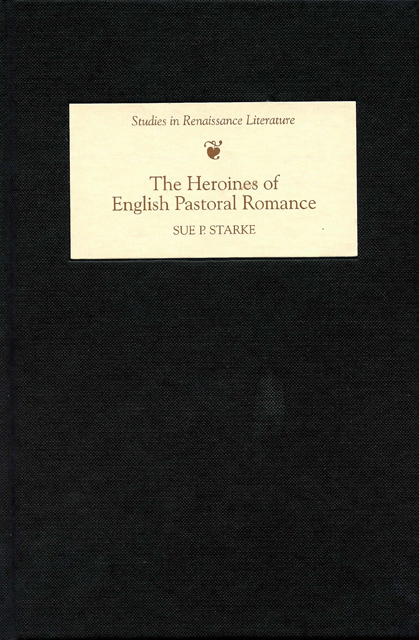Book contents
- Frontmatter
- Contents
- Acknowledgements
- Abbreviations
- Chapter 1 The Pastoral Romance Heroine in English Renaissance Literature
- Chapter 2 The Arcadian Prison: Chastity and the Defense of the Princesses in Sidney's Two Arcadias
- Chapter 3 Spenser's Romance Heroines: The Heroic and the Pastoral in Books 3 and 6 of The Fairie Queene
- Chapter 4 Growing Out of Pastoral: Wroth's Urania and the Female Pastoral Career
- Chapter 5 Fletcher's Clorin and Milton's Lady: The Performance of Chastity in Pastoral Drama
- Chapter 6 Milton's Eve and Marvell's Maria Fairfax: Wives and Daughters in the Pastoral Family Circle
- Bibliography
- Index
Chapter 4 - Growing Out of Pastoral: Wroth's Urania and the Female Pastoral Career
Published online by Cambridge University Press: 10 March 2023
- Frontmatter
- Contents
- Acknowledgements
- Abbreviations
- Chapter 1 The Pastoral Romance Heroine in English Renaissance Literature
- Chapter 2 The Arcadian Prison: Chastity and the Defense of the Princesses in Sidney's Two Arcadias
- Chapter 3 Spenser's Romance Heroines: The Heroic and the Pastoral in Books 3 and 6 of The Fairie Queene
- Chapter 4 Growing Out of Pastoral: Wroth's Urania and the Female Pastoral Career
- Chapter 5 Fletcher's Clorin and Milton's Lady: The Performance of Chastity in Pastoral Drama
- Chapter 6 Milton's Eve and Marvell's Maria Fairfax: Wives and Daughters in the Pastoral Family Circle
- Bibliography
- Index
Summary
Lady Mary Wroth's prose romance, The Countess of Mongomery's Urania, published in 1621, is known as the first romance written by a woman in English. It appeared around the same time as a reprint of The Countess of Pembroke's Arcadia, by Wroth's illustrious uncle Sir Philip Sidney. That Wroth wished her romance to be considered as a legacy of her uncle's work is evident, from the title announcing the dedication, to the inconclusive ending of an incomplete sentence. Wroth's romance is indeed as capacious and errant as her uncle's, and she honors his example with numerous allusions to the plot of the Arcadia, as well as adopting his long periodic style of sentence construction. The euphonious similarities of the two titles also invite comparison between the texts, but a key difference in subject is also implied. Sidney's romance title is explicitly pastoral: Arcadia is the region of Greece most associated with the production of pastoral eclogues. Sidney's fictional setting emphasizes the pastoral culture of Basilius’ kingdom, especially in the New Arcadia, which features eclogues sung by shepherds as entr’acte entertainments between romance episodes. It is impossible to separate the action of Sidney's romance from the place of its performance; the plot involves a constant tension between the narrative forward drive of chivalric adventure and the pastoral impulse to remain inactive, lingering, loving, and singing poetry. Arcadia is not merely a location, but a mindset through which the chivalric martial ethic is examined and judged.
In Wroth's title, the emphasis on place gives way to an emphasis on person. Urania, the titular heroine, is a minor figure from Sidney's romance who becomes a major character in Wroth's. In Sidney's New Arcadia, Klaius and Strephon pursue the elusive shepherdess Urania, whose name recalls the Greek goddess of heavenly wisdom who has fled the earth (Sidney, 61–4). This introductory episode serves only as a lead into the plight of shipwrecked heroes Pyrocles and Musidorus; Urania herself does not figure largely in the subsequent narrative. Wroth takes Urania and opens her own romance from the shepherdess's perspective, filling the character with a past and a motivation independent of her previous status as lost object of desire.
- Type
- Chapter
- Information
- The Heroines of English Pastoral Romance , pp. 107 - 141Publisher: Boydell & BrewerPrint publication year: 2007



